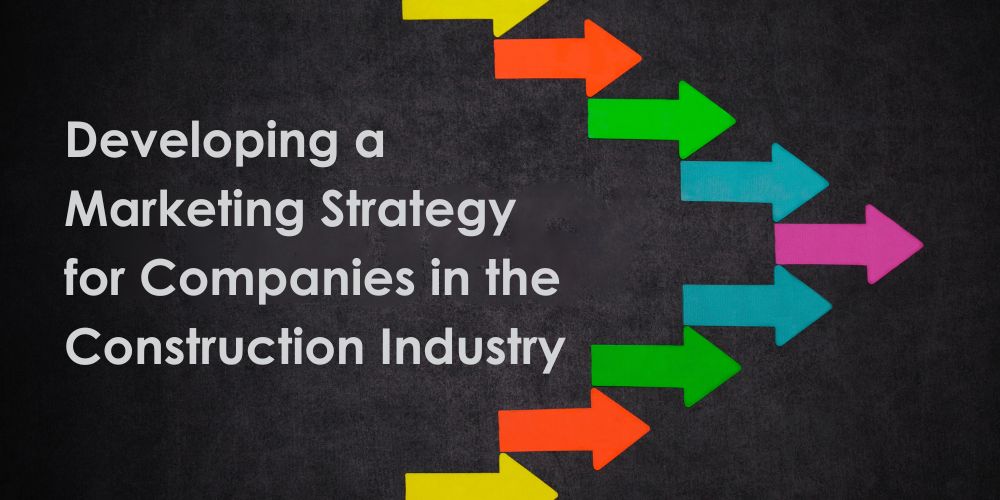Developing a Marketing Strategy for Construction Industry Companies: Essential Practices
In the dynamic world of construction, where projects evolve and market trends fluctuate, the need for an impactful sector-specific marketing strategy for construction is clearer than ever. For those in the construction industry, possessing a clear-cut marketing strategy is not just beneficial; it’s pivotal.
What is a Marketing Strategy for Construction Companies or Companies in the Construction Industry?
Fundamentally, a marketing strategy is a holistic plan aimed at achieving distinct marketing goals that support overarching business objectives. It acts as the roadmap guiding marketing initiatives, ensuring each action falls in line with broader business aspirations. While an overall business strategy outlines the path for the entire venture, a marketing strategy concentrates on aligning marketing endeavors with this larger corporate goal, propelling the organization’s momentum.
Strategy vs. Tactics in Construction Industry Marketing
In developing a marketing strategy for construction industry companies, distinguishing between strategy and tactics is crucial for developing a successful marketing effort. While the strategy dictates the direction and grand objective, tactics are the specific tools and steps taken to realize that aspiration.
Strategy: The ‘What’ and ‘Why’
A marketing strategy in the construction domain serves as the foundational plan guiding your company’s outreach and growth efforts. It’s the big picture, the ‘what’ you aim to achieve, and the ‘why’ behind those objectives. Here are some common strategic goals that construction firms might pursue:
- Lead Generation:
This involves creating strategies to attract potential clients. Whether through content marketing, networking events, or partnerships, the goal is to increase the pool of potential customers. - Driving Qualified Traffic to Your Website:
It’s not just about getting clicks; it’s about getting the right clicks. This involves SEO strategies, targeted advertising, and other digital marketing tools to draw potential clients to your website. - Lead Nurturing:
Once a potential client shows interest, it’s vital to guide them through the decision-making process. This can be done through regular email updates, webinars, or even personalized project proposals. - Client Retention:
Beyond merely acquiring new clients, nurturing existing relationships is crucial. By doing so, firms can secure repeat projects and generate referrals. - Increasing Online Visibility:
In today’s digital age, the online footprint of a construction company is paramount. Strategies here could focus on increasing website visits, bolstering LinkedIn presence, or enhancing overall online engagement. - Reputation Building:
Establishing your firm’s reputation as dependable, forward-thinking, or pioneers in eco-friendly construction practices can set you apart in a crowded market.
These strategies offer a roadmap, helping construction firms navigate the competitive landscape while ensuring alignment with overarching business objectives.
Tactics: The ‘How’
Tactics are the practical methodologies or tools you engage to enact your strategy. Examples include:
- SEO (Search Engine Optimization):
For a strategy focused on enhancing online visibility, optimizing your site for search engines is key. - Content Marketing:
To showcase projects or share industry insights, well-crafted content in the form of blog posts, videos, or case studies can be pivotal. - Google Ads / Paid Search:
If highlighting unique projects is a goal, targeted ads showcasing completed projects or ongoing ventures might be suitable. - LinkedIn for the Construction Industry:
LinkedIn can be an excellent tactic to reach targeted decision-makers in the construction industry. - Construction Email Marketing:
Regular updates about new projects, company milestones, or sharing valuable construction insights can help nurture and maintain client relationships.
The Imperative for Construction Firms to Embrace a Marketing Strategy
Historically, many construction firms leaned heavily on word-of-mouth and long-standing relationships. However, with the digital age and diversifying client needs, solely banking on old methodologies can halt growth. A robust marketing strategy empowers construction firms to stay ahead of competitors, navigate market changes, and set a distinct trajectory for sustained expansion.
Why Marketing Strategy is Vital for Success in Construction
In construction, with its multifaceted projects, diversified client base, and fierce competition, a systematic marketing approach is indispensable. Here’s why:
- Direction & Clarity:
A strategy ensures all marketing pursuits uphold a unified vision, maintaining alignment with overarching organizational objectives. - Reputation Building:
Amidst numerous construction firms, how do you differentiate? A regularized marketing strategy aids in crafting and bolstering your brand’s persona. - Resource Optimization:
Every firm operates within resource constraints. A streamlined strategy ensures optimal utilization, maximizing ROI. - Competitive Edge:
A crystallized strategy allows construction firms to discern and capitalize on market gaps more promptly than rivals. - Adaptability:
Client preferences evolve, new construction technologies emerge, and market trends oscillate. A flexible marketing strategy ensures companies remain attuned and agile. - Tailored Communication:
Strategically designed messaging appeals directly to the intended audience, optimizing engagement chances. - Performance Gauge:
Clear strategies provide performance metrics, spotlighting areas of success and avenues needing refinement.
Understanding the Commercial Construction Audience Strategically
The times when construction companies could adopt a one-size-fits-all approach for their clients are behind us. Today’s clients span from small businesses to large multinational corporations, each with unique project specifications and expectations. Strategic marketing identifies and addresses these diverse needs, ensuring customized and effective communication.
The Crucial Nature of Defining Marketing Objectives Within the Strategy
The lynchpin of an effective marketing strategy for construction is pinpointing precise objectives. Without them, marketing actions risk being unfocused or misdirected. Succinct objectives act as beacons, ensuring resources and efforts are optimally utilized. Skimping on this step can lead to squandered opportunities and funds. However, dedicating time to chisel out these goals ensures each marketing action, digital or otherwise, culminates in tangible outcomes.
Overcoming Strategy Pitfalls
While the intent might be robust, not all strategies manifest the envisioned outcomes. Common stumbling blocks could be strategy-practice misalignments, resistance to adapt, or an absence of feedback-driven refinement. Navigating these challenges demands agility, perpetual learning, and an unwavering commitment to continual strategy enhancement.
Conclusion
In the cutthroat construction domain, a refined marketing strategy isn’t merely an add-on; it’s the catalyst fostering growth and distinction. Regardless of whether you’re an established construction magnate or a budding firm, channeling resources into a meticulously sculpted marketing strategy is non-negotiable. Looking for a marketing agency for construction companies? Ready to amplify your construction enterprise with a performance-centric marketing strategy? At ZAG FIRST B2B Marketing, our expertise lies in formulating sector-specific marketing strategies, ensuring you always have the upper hand. Contact us to learn more.





